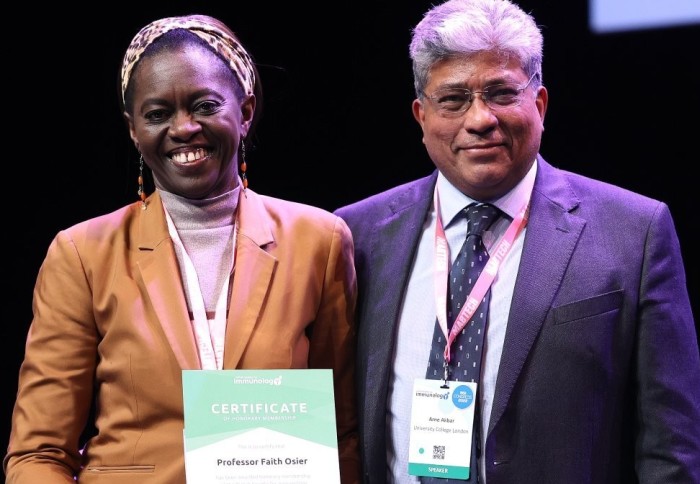Prof. Faith Osier receives prestigious award for her contribution to Immunology

Prof. Faith Osier receives her BSI honorary lifetime membership from BSI President, Prof. Arne Akbar
Only two awards were given by the British Society of Immunology (BSI) this year, and Professor Osier is one of recipients.
She was awarded the Honorary Lifetime Membership for her outstanding contribution to Immunology at the opening of BSI congress in Liverpool, on the 5th December.
Professor Faith Osier studied medicine in Nairobi, Kenya and while working as a Junior Doctor (1998-2001) in a rural hospital in Kilifi, she would admit up to five children, with malaria, to the high-dependency unit and many didn’t survive. This inspired her to think about prevention and how she could stop children from getting malaria in the first place to ‘Make Malaria History'
Increasing African representation in the global research community.
Professor Osier won an African Research Leader Award, funded by the UK MRC and the former UK Department for International Development, which kickstarted multicentre research studies that evolved into the SMART South–South Malaria Antigen Research Partnership with Ghana, Senegal, Mali, Tanzania, Uganda, and Burkina Faso. She used this partnership to enable a study of 10,000 samples using an innovative custom malaria protein microarray, KILchip©, that her team designed, to help identify malaria vaccine candidates.
Her work focusses on mechanistic studies to help answer why the burden is disproportionately high in infants and young children and why this vulnerable group becomes increasingly resistant with age. This insight will be critical for developing malaria vaccines because unlike SARS-CoV-2, the malaria parasite surface has a multitude of proteins that make it difficult to pin down the ones that would stop the disease in its tracks. Studies of naturally acquired immunity help to identify the proteins that drive the protective immune response.
The hope is to create a vaccine that in a single or handful of shots recreates the immunity that is acquired over many years. Although one malaria vaccine has been licenced by World Health Organisation, it has an efficacy of 30-40% with a limited duration of protection. Professor Faith Osier passionately believes “we can do better!”
She also presented some of her research in the Tropical Diseases session during the BSI congress “It was an honour to be invited to deliver a Plenary Lecture in which I highlighted the fact that the burden of malaria is still exceptionally high and the importance of continued efforts to develop highly effective vaccines.”
Professor Osier is currently the Co-Director of Imperial’s Institute of Infection. In 2019, she became the first African (and only the second woman) to become President of the International Union of Immunological Societies (IUIS) which has 60,000 members globally. During her term there she helped launch the Federation of African Immunological Societies Legacy Project, which aims to train 1,000 new PhD students over 10 years to build capacity for research in Africa. Professor Osier is interested in leadership issues of equity and diversity, particularly elevating the role of women. She’s a role model, motivator, and passionate supporter of scientists from low and middle-income countries.
Not only is she a Fellow of the African Academy of Sciences and a TED Fellow. Professor Osier has also won several international Awards such as the Royal Society Pfizer Award, the Merle A Sande Health Leadership Award and the Sofia Kovalevskaya prize from the Alexander von Humboldt Foundation. The Honorary Lifetime Membership is an addition to her many accolades.
Dr Doug Brown, Chief Executive (BSI): “We would like to make this offer to Faith in recognition of her achievements through her research, and for her support of the BSI and IUIS”
Professor Osier: “News of the award brought tears to my eyes. I am so grateful that my work is appreciated. I am indebted to scientists all around the world that care about these issues and work to address them.”
By receiving this award, she joins the list of other notable Imperial recipients, including Professors Danny Altmann and Peter Openshaw.
Article text (excluding photos or graphics) © Imperial College London.
Photos and graphics subject to third party copyright used with permission or © Imperial College London.
Reporter
Natasha Khaleeq
Institute of Infection